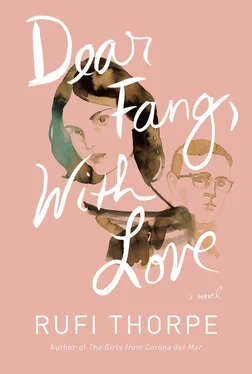Like, I am scared to even be writing this down, but if we are going to talk about evil on a human level, on like a one-to-one level, it seems like people generally have reasons for murdering each other. They might be WRONG. They might be stupid reasons. But they have them, and so I think the Germans had reasons, but whenever their reasons are explained to me they make no sense and I feel like someone is hiding something from me.
And here is what I think they are hiding: Humans don’t need a reason. In other words, even their reasons are never the real reasons. The idea that we are rational and in control of our actions is a recent and temporary delusion. For most of history, we have totally been murdering each other. We are just violent animals. We like to hurt each other. It feeds some part of our nature. And so we will find any excuse to do it. Sometimes it is greed, like with slavery or with the colonization of America. But sometimes we can kill people for hardly any reason at all. My mom was complaining about social media making us crazy and the world being so violent and on Facebook you hear about every single sad story of a dad beating his kid to death, but I was like, Mom, wake up, imagine what it would be like to hear someone live-tweeting the Wild West. It would be terrifying. Shit is way more under control now.
But maybe it isn’t. Maybe underneath all that control is something terrifying and liquid and burning, like lava. Maybe sometimes it just bubbles up.
Poor Judith. Why would I make her have to explain such a thing to me? I am ashamed. She is just a widow, wandering alone through this world, and I tried to force her to articulate the most terrifying truth there is.
I am suddenly very tired.
With love,
From Vilnius,
Your sorry,
V
“THANK GOD YOU SAID SOMETHING,” Susan said, “because I was going to make myself take my medicine and go, but I really think I would have had a mental breakdown.” We were in a tiny Moroccan restaurant where we sat on pillows and where the service was very slow and the food entirely mediocre, bowls of lukewarm lentils, stacks of dried-out pita bread. Even though it was early afternoon, we ordered wine, a red that was inexplicably sweet and metallic-tasting.
Susan told me she stayed up all night the previous night reading the diary of Kazimierz Sakowicz, which described in precise detail the murders at the pits in Ponary. His farm was right there on the road, and he began to keep a record of what he was seeing from his house, and then he buried the pages in a lemonade can in his yard where they were later recovered. It was always a detail like that which defeated my attempt to not imagine these horrible things actually happening: a lemonade can. I pictured a Minute Maid can, though of course it couldn’t have been.
“No emotional content at all,” Susan went on. “It’s addictive to read, you kind of can’t stop, but at the same time by two in the morning I was so sick I thought I would throw up and then I just couldn’t sleep. The Jews in Vilna finally figured out what was going on because some of the children survived in the pit and then climbed out again at night and walked all the way home. Can you imagine?”
Susan’s voice had caught in her throat and she fanned herself with a stiff piece of pita bread. “So then, in the middle of that state of mind, and keep in mind I’m in a hotel, not an apartment like you, so I don’t even have a kitchen to make tea in! So then, my ex-husband calls me, drunk, he’s obviously relapsed, wanting to talk to me about his business, which he is absolutely running into the ground, and he keeps saying the same things over and over again, how he’s so stupid and he’s a failure and he should just kill himself. And I’m thinking, ‘Why do I participate in this? Why is my life such that this man can call me and make me deal with this in the middle of the night?’ I’m sorry — this is too much information, I know, but I haven’t slept and, you know — don’t think I’m some melodramatic person. I could paint this all in a different light and talk about how I have to have Rick in my life because of my son, and how I try to see the best in people, and blah blah blah. I could make it look good. Or if not good, at least presentable.”
“No,” I said, “I get it. I don’t think you’re—”
“A crazy codependent who lets her alcoholic ex-husband ruin her life even when she is taking a vacation by herself focusing on the genocide of her own people?”
I laughed. Susan widened her eyes, smiling now too. “Seriously, though, you don’t think that, right?”
“Right.”
“Thank God for that!” she cried, and pretended to wipe sweat from her brow. I refilled our wineglasses. Now that we had drunk a glass, the horrible flavor of the wine was more palatable.
“So tell me,” she said, “how are you fucked up, dear Lucas? What’s your drama?”
I disliked the word drama. I almost didn’t want to answer, but Susan was so frank about herself. I wanted to be like that too. “The whole situation with Kat — that’s Vera’s mother — it’s easy to pretend that we were just kids being stupid and she got pregnant by accident, but it wasn’t that. We got pregnant on purpose.”
I let out a breath, afraid to continue, but I saw that Susan was listening, really listening, not even chewing her food or playing with her wineglass. She was just sitting there, waiting. So I told her. I told her about the secret bathroom and about Allen Ginsberg and about the maddening way Katya would eat baby food with a little spoon. I tried to explain about that night, Katya whispering in my ear, “Let’s make a baby, baby,” and about how I had wanted to, how on some deep biological level it had seemed like the right thing to do, the only sane thing to do. I told her about the road trip that summer and about the commune. I didn’t tell her about Chloe, though. In the moment, it seemed irrelevant. Like maybe Chloe had just been an excuse all along, that my real failing had been not being bold enough to love Katya, to follow that road wherever it led. I had never presented it to anyone like this before. Most of the time, I didn’t even think of it this way myself — because it was too painful to really allow myself to think of: that the thing between Kat and I had been real.
“You can imagine Katya hated me after that,” I said.
“Gosh, how interesting,” Susan said, and it was a relief that she was interested instead of sorry for me or judging me, almost as though it were a movie, something impersonal. “Because there are those layers of reality: the private, kind of on-the-moon reality of two lovers, and then the reality of the world, your parents, making money.”
“But after that, I think,” I said, “I was very suspicious of the part of myself that had done that. I didn’t feel like I could be trusted, and so I tried to date only girls who were very safe and very ordinary and where no one could get hurt.” I thought of Amanda. What a crock of shit. What a liar I was. It wasn’t that no one could get hurt, I thought; it was that I couldn’t get hurt.
“Well, you have lots of time. You could still get married,” Susan said. “It’s different when you’re my age. All the available men are fish that have already been thrown back. Everyone has gotten divorced. They have years of bad habits and resentments built up and you have to try to find someone who is fucked up in the exact matching, complementary way to your own fucked-up-ness. It’s very tiring. Excruciating, really. And all the men who want to date me are in their sixties, all the guys my own age are dating thirty-year-olds, and it’s like dating Mr. Rogers, I swear to God.”
“Could I not be a fish?” I asked.
Читать дальше












